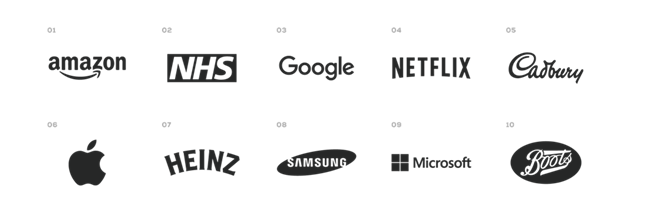The NHS now ranks higher than Google, Netflix and Apple in UK brands following the pandemic, while Amazon retains the top spot, according to a new survey.
Opinium unveiled the Top 100 Most Connected Brands in the UK. Now in its fourth year, the ranking is the first ever Index to be compiled by exclusively from consumer feedback. While Amazon tops the ranking for the fourth year, the NHS is a brand new entrant at second place, highlighting how influential it has been to consumers this year.
Opinium interviewed 6,000 consumers, collated 5,514 spontaneous brand mentions, and facilitated 46,256 brand reviews to identify the 100 Most Connected Brands in the UK: those that have succeeded in becoming indispensable to consumers’ daily lives. These brands challenge conventions build unbreakable bonds and define how consumers interact, whilst remaining true to themselves.
Wez Eathorne, Research Director at Opinium comments: “It has been a long and intense year of on and off lockdowns. Social limitations and closures of many places have greatly affected all our lives. In all this, it has been heart-warming to see how the NHS, a previously unmentioned competitor, has parachuted into 2nd place in the Index, ranking top 3 across all key measures.
“A previously undervalued brand that brought entire communities together each Thursday in applause, making everyone appreciate the dedication of those working on the frontline, the NHS rose to the challenge in the face of a global pandemic, doing all in its power to save lives. This ranking shows that this year consumers, now more than ever are looking for brands which offer safety and security.”
Top 10 Most Connected Brands

Why the NHS ranked so highly – and other chart toppers
The Most Connected Brands Index this year shows how the global pandemic has touched every facet of consumers’ lives. Forcing us to adapt how we shop, socialise, communicate, and work, it has coloured and shaped fortunes of entire sectors and brands.
A previously unmentioned competitor, and traditionally not considered a brand, the NHS has been a guiding light for the nation through this pandemic and has been at the forefront of nationwide campaigns. The NHS enters the Index this year in a strong position in 2nd place, ranking top 3 across all measurements and the highest out of all brands on the Index’s Dynamism and Emotion measures. For ten weeks in the original lockdown, the nation took to their doorsteps every Thursday to applaud the key workers saving lives and keeping the country going.
As well as grass roots initiatives, the NHS was a key theme of the government messaging for the spring of 2020, where the nation was urged to “Protect the NHS”. In addition, the Government has been reported to have spent more than £184 million on Covid communications and advertising in 2020 alone. The emotional importance of the NHS to the nation can be clearly seen if we look at the emotions that people relate to the brand, with it achieving the highest score for belonging, hope and pride.
Meanwhile, Amazon continues to hold its 1st place on the Most Connected Brands Index. Along with Google, the brand has dominated the Prominence measure over the past 3 years, continuing to rank 1st place in this area. It also leads the way in Distinction, especially for those over the age of 50, as Amazon became a lifeline for older consumers who needed to shield.
Netflix keeps 4th place, making its way into the top 10 in terms of Prominence, increasing its position six places from 2020 and 48 places since 2019. While “Netflix and chill” might have become an illegal activity for those not in the same household in the past 12 months, alternative entertainment options have dwindled and by the summer of 2020 Netflix had 26 million new subscribers. It is among the younger generation (18-29) year olds where Netflix is most prominent and ranks second out of all brands, only just following Apple.
Disney ranks 22nd on the Most Connected Brands Index, up 11 places from 2020. Launched just in time for the first lockdown, Disney+ brought a new excitement into the competitive streaming service landscape, contending against Netflix’s $1bn UK budget.
Reflecting the events of this past year, new entrants in 2021 include Gucci, Tesla, National Trust, Mars, Curry’s PC World, Spotify, Etsy, FitBit and Xbox.
Alexa Nightingale, Research Director at Opinium comments: “Most Connected Brands was first published in 2018 – born out of the lack of brand rankings available, that simply asked the people who have the power to build, define and sometimes destroy the brands that marketers create: the consumers themselves. Fast forward four years and the idea of asking the people, and reflecting the human, lived experiences of the pandemic has never been more relevant.
“This year’s ranking is forged in the collective shared experiences of lockdown and loss, but also resilience, hope and opportunity. As restrictions start to ease across the UK, our belief remains that building connection has never been more important. Whatever your political, economic, or social viewpoint, 2020 has been a year of unprecedented rapid change that shows no sign of abating. The ability of people, brands and businesses to create lasting connections has become fundamental to both personal and professional success.”
Measuring Connection
Opinium’s Most Connected Brands Index is the combination of four key brand metrics which are weighted together to produce a one number summary of a brand’s ability to connect with consumers. These measures are:
1. Prominence: The brand’s presence and scale
2. Distinction: The brand’s unique identity and ability to set trends
3. Emotion: The brand’s ability to form emotional relationships
4. Dynamism: The brand’s momentum and social traction
Brand connection in the time of coronavirus
Changing how we work and where we work Arguably, the most influential change the pandemic has brought has been to our working lives. Even though our freedoms have been stripped away by the pandemic, we have never had greater freedom to determine our working patterns and routines. The requirement for non-essential workers to forgo their daily commutes and embrace virtual working has meant that the tools required to support this have therefore never been as important nor as high profile. This has led to a marked increase in the rankings for technology providers.
A health and wellness bug alongside a nation comfort eating A second trend has been the explosion in health and wellbeing as people found themselves anchored to their local areas with physical exercise one of the few pastimes available to them. This has led to brands like Nike and Fitbit surging up the rankings. Ironically confectionery brands have also benefited from the pandemic with a nation eager for a slice of happiness and distraction that can be bought over the counter.
A nation desperate for entertainment, escapism, and distraction Unsurprisingly, the pandemic and associated lockdowns have seen the entertainment sector thrive. Whilst it is easy to think that people have been living on a diet of Netflix boxsets it is not just streaming companies who have benefited. Brands such as Waterstones and the National Trust have powered up the rankings as consumers seek to escape the confines of their living spaces and look for screen-free sources of entertainment.
Signalling the death of the high street or just ‘non-essential’ shops? For retail, the term non-essential has become the difference between a thriving business and unemployment and store closures. Brands that were less affected by restrictions such as M&S and Boots have proven far more resilient than those deemed non-essential, with retailers like Primark and New Look facing an existential crisis as the pandemic has accelerated the adoption of online shopping.
Forcing people off public transport, with a greater environmental awareness One positive consequence of the first lockdown in March was the environmental impact as air quality dramatically improved with travel restrictions and reduced commutes. However, optimism that this would have a lasting effect on our relationship with the planet was quickly checked when the first lockdown finished. The public’s concerns over the safety of public transport coupled with the desire to escape their local areas meant car manufacturers surge up this year’s rankings. Nevertheless, sustainability has not been banished from consumers consciousness, with brands such as Tesla entering the Index for the first time.
The Most Connected Brands 2021 ranking
1. Amazon
2. NHS
3. Google
4. Netflix
5. Cadbury
6. Apple
7. Heinz
8. Samsung
9. Microsoft
10. Boots
11. Walkers
12. Marks & Spencer
13. Lego
14. Tesco
15. Aldi
16. eBay
17. Sainsbury’s
18. Kellogg’s
19. BBC
20. Coca Cola
21. Lidl
22. Disney
23. WhatsApp
24. Sony
25. Dove
26. Dyson
27. Ikea
28. Morrisons
29. Argos
30. Nike
31. John Lewis & Partners
32. Lindt
33. B&Q
34. McDonald’s
35. Mars
36. Bosch
37. Asda
38. Nivea
39. Nestlé
40. b&m
41. Curry’s PC World
42. Nescafé
43. Iceland
44. Greggs
45. Panasonic
46. Sky
47. Costa
48. Adidas
49. Ford
50. hp
Source: www.opinium.com

